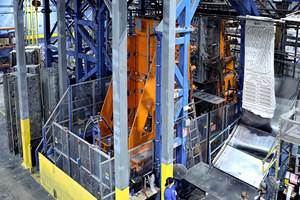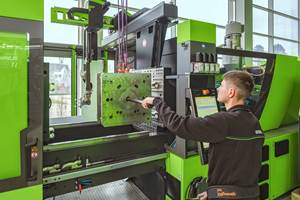Blow Molder with a Mission: CKS Packaging Shares Gains Of Its Phenomenal Growth
From three machines in 1986 to 27 plants nationwide today, this family-owned processor has prospered through unwavering customer service, committed employees and dedicated service to its community.

Family firm: Charles K. Sewell (seated), founder of CKS Packaging, just turned 92 and is still active as chairman. Standing are his three sons: John, CEO; Scott, co-COO in charge of operations; and Drew, co-COO in sales. (Photos: CKS Packaging)
There are many ways to prosper in business, and Charles K. Sewell decided in 1985 that his new plastic container operation, CKS Packaging, would succeed by building on his own 30-yr success in plastics blow molding, energized with a vow to share the company’s earnings with the needy in his community.
Charles Sewell had already built one thriving, multi-plant blow molding company. His father owned Sewell Dairy Supply Co. in Atlanta, which provided local dairies with paper cartons and glass bottles. When the plastic gallon jug came along, the family company adopted it but could not get a continuous supply. Charles convinced his father to start blow molding their own plastic bottles, later diversifying into other containers. Charles and his younger brother Joe established what became Sewell Plastics in 1964. By the late ‘60s, the company had grown to five plants in the Southeast. In 1970 the Sewell brothers sold their company to The Dorsey Corp. and Charles stayed on as president of the new subsidiary. In 1977 Sewell Plastics reportedly produced the first 2 L soda bottle for The Coca-Cola Co.
Four generations of experience in plastic containers.
When Charles left that company in 1982, Sewell Plastics had grown to $300 million in annual sales. When his non-compete contract ended, Charles founded CKS Packaging in Atlanta, and started production in 1986 with three machines and a philosophy of putting the customer first and providing top quality and service to all customers, as well as treating employees as the firm’s greatest asset.
Today, the company has grown to one of the top 10 blow molders in the U.S., with 27 plants, half of them from acquisitions. CKS Packaging employs over 3000 people and operates over 400 blow molding machines—the largest share continuous-extrusion shuttles, and about one-quarter of them stretch-blow machines (both one- and two-stage) for PET, and the rest reciprocating-screw units. In addition, the company has an undisclosed number of injection presses for molding PET preforms.

Best sellers: (Left) A bottle designed 15 yr ago, originally for PETG copolyester, now converted to EPET containing recycled resin. (Right) HDPE jug for dairy and water, lightweighted by over 10%. (Center) Ice cream jar using up to 100% rPET.
CKS Packaging serves a wide range of markets: beverages, including juices, dairy, water, teas, and nutritional drinks; foods (wide-mouth jars as well as bottles); consumer goods—household cleaners, personal care, toiletries, cosmetics, pharmaceutical; chemical products—agricultural, pool supplies, lawn and garden (view stripe available), UN-certified industrial containers; and automotive—cleaners, polishes, fuel additives, motor oil. All segments are said to be growing, in a mix of 70% stock containers and 30% custom.
Besides HDPE and PET, the company processes PP and PVC—which continues to grow each year, though lately customers have been under pressure to convert to other resins that are more readily recycled. CKS Packaging had been one the largest users of PETG copolyester until that resin became harder to obtain, and now is gradually converting those jobs to the growing alternative of extrusion blown PET (EPET) or to HDPE.
Fourth-Generation Family Leadership
At age 92, Charles K. Sewell remains active in the company as chairman. Day-to-day operations are managed by his three sons: John as CEO and Drew and Scott as chief operating officers, with Drew focused on sales and Scott in charge of manufacturing operations. A non-family member, Bob Oliver, is president.
John started working for the company in his spare time when he was 15 and Drew when he was 12. Drew recalls, “Dad said, on a weekend, if you don’t have sports practice or a game, you don’t get to lay in bed or watch cartoons—go to work!”
A fourth generation of Sewells has now entered the family business. Nine children of the brothers and three sons-in-law are working in jobs from maintenance to job scheduling. John’s daughter Georgia is being groomed to be company president one day. “She’s a fixer—she goes to problem plants and fixes them,” her father states. Step-brother Joshua Stephens was promoted to vice president.

True to their roots: John Sewell, with brothers Scott and Drew, holds a dairy jug, harking back to their father’s roots in a family dairy. Dairy containers are still a major product for the firm.
Under family direction, the company is on track to top $750 million in sales this year. “We have grown every year, way ahead of the industry average,” states Drew Sewell. “We still grow in difficult times when others do not. We are truly blessed.”
The company’s acquisition-fueled expansion has a goal in view. Says John Sewell, “Ultimately, we want to become a nationwide manufacturer.” Today, its locations are heavily concentrated in the Southeast and South Central regions, with a handful in the Midwest and Central states and one each on the East and West Coasts. John wants the whole country to enjoy what the company’s regional customers have today: “We receive an order for a stock product, and we can have a truck on the road within two hours. You’ll get it today or tomorrow.”
Duplicating multiple machine platforms across many plants provides uninterrupted service when “chaos” strikes.
How will CKS Packaging achieve this goal? “Dad said we have two things to sell, quality and service,” says John Sewell. “In service, we are absolutely Number One in the industry. ‘The customer is still KING’—that’s ingrained at each of our operations.”
On top of that, he adds, “We thrive in chaos—COVID pandemic, hurricanes, power outages. We have many plants and many different machine platforms, and we have duplicated systems at multiple locations, so we can shift production if circumstances require it. As a result, we did not miss a shipment during the worst of COVID.”
Scott Sewell adds, “Our group never missed a day during COVID. We spent hours reviewing the schedule daily to ensure our customers were taken car of. We have gained so much business because we were able to ship product when others couldn’t.”
Even though their business is weighted heavily toward stock containers, their custom business is growing, aided by the company’s Studio G (for the Book of Genesis) design studio at the Atlanta headquarters. “Give us a napkin drawing and we’ll get you a 3D-printed sample in 24 hours,” says Drew Sewell.
CKS Packaging also supports its customers’ increasing focus on sustainability. “Lightweighting is a constant effort,” says John Sewell. “In the case of one HDPE water gallon, we achieved a 10% weight reduction.”
Customers also want to use recycled resin where possible; some even use 100% PCR in certain products. CKS Packaging purchases several hundred thousand pounds of CPR per year.
In addition, the company uses recycled corrugated boxes from Pratt Industries, Conyers, Ga., and is constantly upgrading plants with more energy-efficient electrical motors, air compressors, air conditioning and warehouse lighting. It also has purchased all-electric molding machines and will add more in the future. Four “on-site” blow molding operations located at customer plants save shipping fuel, cost and time. The firm often moves stock and custom molds close to customer locations for the same reasons. In addition, Drew Sewell says, “We are educating ourselves on biobased and biodegradable resins. There’s not much demand now, but we want to be ready if and when it comes.”

Loyal workforce: Second-, third- and fourth-generation employees from the same family with Scott, John and Drew Sewell.
Investing in Employees
“People are our greatest asset,” says Drew Sewell, pointing to numerous employees that have been with the company for 30, 40 and even 50 years. “We have 4th-generation employees in the same family working here.” One of those assets is sr. v.p. of sales Dave Crompton, who is responsible for hundreds of millions in sales for the company, notes John Sewell.
He credits the company’s policy of “celebrating the dignity of every human life. We treat our employees with dignity and respect. In return, they would walk through a wall for us.”
In particular, Drew points to the company’s Second Chance program. “We hire out of prison when nobody else will—nonviolent, non-sex offenders. We don’t judge.” In addition, the company offers a rehab program for people who want to kick alcohol or drug addiction. “After a year in the program, we will hire them. We have 350 full-time Second Chance hires.” They include shift supervisors, numerous technicians and even a plant manager. That’s the source of walk-through-walls dedication, Drew explains, adding that “we’re starting a veterans outreach program now.”
What does it take to build ultimate employee loyalty and dedication in these times?
This extraordinary loyalty has helped the company deal with labor shortages, especially during the recent pandemic. “We’re like everyone else in needing more workers. But when we’re down a few people due to sickness or otherwise, everyone chips in to make up for it.” The company is enlisting technology to help, too — investing in robots, conveyors and automated packaging to make its labor force more productive.

Giving Back: CKS Packaging is a co-founder and major supporter of Maximum Impact Love Inc., which provides food, clothing, health and dental screening, financial assistance and children’s gifts. Employees and volunteers of the organization are shown here.
A Covenant for Success
As its website states prominently, CKS Packaging is “a Covenant company.” Drew Sewell explains what this means with a short story: Years ago, he asked his father Charles why he was so successful in business. Charles responded that the answer was simple: He had made a covenant with God when he founded the company to support Christian ministries with the firm’s profits. “He kept his promise, and God kept His,” Drew concludes.
John Sewell adds, “CKS desires to be servant leaders and operate with humility. There are three key things we do: One is tithing — contributing more than 10% of our profits to support at many charitable Christian ministries. Second, we open every meeting with prayer. There are also a daily prayer call in the plant and a monthly prayer and fast on Wednesday, with Bible study optional, in addition to normal breaks. Third, we work six days a week, not on Sundays.”
A Covenant company shows how success in business can be about more than just business.
Drew Sewell is active in another major element of the firm’s dedication to God and to good corporate citizenship. He is the founder of Maximum Impact Love, a 501(c)(3) nonprofit partnership of CKS Packaging. Started in 2007, the organization has presented at least three major charitable events annually for the past 18 years. To prepare for these Maximum Impact Love events, the organization visits poorer neighborhoods and homeless encampments and distributes flyers advertising the upcoming event. Buses are provided for free transportation.
These events, typically attended by 2000 to 5000 people, are held outdoors or in a 150,000 ft2 CKS Packaging warehouse. They provide a meal, food to take home, haircuts, clothing, health and dental screening, prayer, gifts for kids and a place for them to play. This year’s Spring event distributed 2000 boxes of groceries. A Back to School Bookbag event in July gave out 4000 bookbags filled with school supplies. And the coming Christmas event will present, besides a hot meal, three wrapped and individually addressed presents for each child.
This warehouse also is open daily to give out food and clothing and welcome people to the rehab program. Maximum Impact Love also offers to give the needy up to $1000 once per year for necessities such as utilities bills and car or house payments.
Drew Sewell sums it up: “There are people in need and there are people with resources and solutions.”
Related Content
Paulson Training Acquired
Certus, a technical skills training business and portfolio company of private equity firm Ridgemont Equity Partners, has acquired the plastics processing training business founded in 1981.
Read MoreTeaching Kids About the ‘Magic’ of Manufacturing
Making something out of (almost) nothing is an ‘eye opener’ for youngsters in their first exposure to plastics processing.
Read MoreThe Cost of High Employee Turnover in Injection Molding: Why Retention Matters
Starting in molding in 1993 and clocking in for nearly every job on the floor over the intervening decades, I’ve seen all sides of the hiring, training and retention process in the industry. Here are my thoughts on how to keep your most important asset — your people.
Read MoreMold-Change Time Targeted with Training, Technology
Engel is offering technology and training to molders to help them optimize their mold-changing process.
Read MoreRead Next
Beyond Prototypes: 8 Ways the Plastics Industry Is Using 3D Printing
Plastics processors are finding applications for 3D printing around the plant and across the supply chain. Here are 8 examples to look for at NPE2024.
Read MoreMaking the Circular Economy a Reality
Driven by brand owner demands and new worldwide legislation, the entire supply chain is working toward the shift to circularity, with some evidence the circular economy has already begun.
Read MorePeople 4.0 – How to Get Buy-In from Your Staff for Industry 4.0 Systems
Implementing a production monitoring system as the foundation of a ‘smart factory’ is about integrating people with new technology as much as it is about integrating machines and computers. Here are tips from a company that has gone through the process.
Read More





















